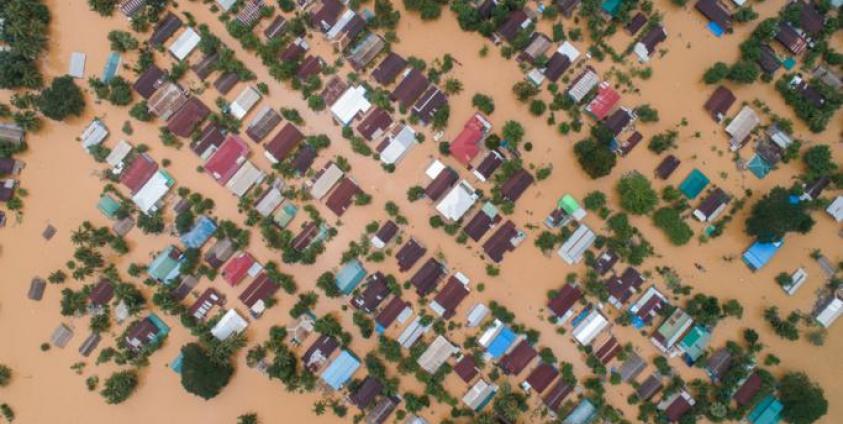This aerial photo taken on August 11, 2019 shows floodwaters submerged areas of Ye township in Mon State. Photo: Sai Aung Main/AFP
The risks of climate change to Myanmar were discussed at a seminar for MPs organised by the United Nations Development Programme (UNDP) in Naypyitaw this week.
The event held on September 9 gave MPs from seven Hluttaw committees a chance to discuss the issue with three international climate and environment experts working in South East Asia – including Camilla Fenning, the Head of the UK Government’s South East Asia Climate and Energy Network.
Camilla Fenning, Head of the South East Asia Climate and Energy Network, UK Foreign Office, commented that:
“Hearing from MPs about Myanmar’s climate and environmental challenges underlined the need for urgent climate action by all countries to reduce greenhouse gas emissions and step up collaboration on resilience and climate finance. Discussions also highlighted Myanmar’s huge potential for renewable energy and the economic and environmental benefits investment in green growth could bring.”
The seminar took place after fresh concerns have been raised about the impact of the climate change crisis on Myanmar. The historian U Thant Myint-U has called it the biggest challenge facing the country, recently saying that “the impact of climate change on Myanmar will be nothing less than catastrophic.”
During this year’s monsoon season in Myanmar over 100,000 people had to be evacuated from their homes because of flooding and a landslide caused by torrential rains in Mon State left more than 70 people dead.
Nicholas Davies, UK environmental specialist said:
“Climate change could have profound implications for South East Asia and Myanmar in particular. Hluttaw committees will have an important role in scrutinizing progress on this issue.”
Timothy Boyle, a UN expert on the dangers of deforestation in Myanmar, concluded that:
“Forests are an integral part of Myanmar’s economy, environment and culture, and are also the source of around 80% of Myanmar’s greenhouse gas emissions. Therefore action to ensure conservation and sustainable management of Myanmar’s forests is essential.”
Myanmar has been one of the three countries most affected by weather-related damage (storms, floods, heat waves etc.) in the last two decades, according to the Global Climate Risk Index 2019.
Scientists warn that climate change will lead to an increase in the frequency and intensity of heatwaves, droughts, floods and other extreme weather events.
Participants discussed the ongoing international climate negotiations and what actions Myanmar could take to prevent the worst impacts of climate change and adapt to its effects.
The climate of the planet is changing because deforestation and the burning of fossil fuels - like coal, oil and gas – is causing a build-up of heat-trapping greenhouse gases in the atmosphere. South East Asia is one of the regions of the world most at risk from climate change. Poverty levels remain high and a large proportion of the population and economic activity is concentrated along coastlines and rivers. The region is heavily reliant on agriculture and dependent on natural resources and forestry that are vulnerable to weather events and changes in the climate.
The UK is nominated to host a major United Nations climate change summit – known as COP26 - in 2020. The conference has been described as the most important gathering on climate change since the Paris agreement was signed in 2015, as it will review the Nationally Determined Contributions (NDCs) to limit or reduce emissions that individual governments were required to submit.
Myanmar has signed the Paris agreement and submitted its NDC in 2017. Decisions that policymakers in Myanmar take in the coming years will be crucial in determining whether the country protects its existing forests and biodiversity, and invests in clean low-carbon electricity generation or more polluting alternatives like coal.








